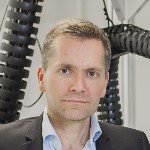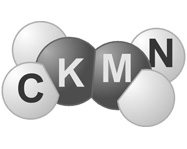Avondlezing door dr.ir. D.R. Schaart georganiseerd door de Chemische Kring Midden Nederland.
Samenvatting
About half of all cancer patients receive some form of radiotherapy. Ideally, a sufficient radiation dose is given to the tumor to kill all cancer cells, without inducing unwanted side effects. In reality, compromises always have to be made. The majority of patients are irradiated with high-energy X-ray photons.
For radiotherapy purposes, the physical properties of protons are much more attractive. However, the characteristic dose profile, with a sharp dose falloff behind the so-called Bragg peak, also makes proton therapy sensitive to deviations from the treatment plan. Examples are patient setup errors, inter-fraction anatomical changes, intra-fraction organ motion, and range uncertainty.
These phenomena may, if not adequately dealt with, result in severe overdosing to healthy tissues and/or underdosing in the tumor. In photon radiotherapy, image guidance has developed to a point where highly optimized dose distributions are applied routinely and safely in the clinic. Moreover, the current trend is to not only utilize anatomical, but also molecular imaging data in the radiotherapy workflow. To maintain its advantage compared to photons, similar approaches need to be developed in proton therapy.
The Holland Proton Therapy Centre (HollandPTC), a joint initiative by Erasmus Medical Center, Leiden University Medical Center, and Delft University of Technology, has the ambition to realize the full potential of proton therapy, so as to improve clinical outcomes while reducing the side effects of therapy. This talk presents some of HollandPTC’s research activities and how they will contribute to the development of the next generation of proton therapy.
Curriculum Vitae Dennis R. Schaart is head of the section Medical Physics & Technology at the Radiation Science & Technology department of Delft University of Technology (TU Delft).
Dennis R. Schaart is head of the section Medical Physics & Technology at the Radiation Science & Technology department of Delft University of Technology (TU Delft).
He started his career as an R&D physicist at Nucletron (now Elekta), where he developed new devices for radiotherapy. In his private time he wrote a PhD thesis on the subject of intravascular brachytherapy, for which he obtained his doctoral degree (with highest honors) at TU Delft in 2002.
He subsequently joined the university to set up a new research line on in-vivo molecular imaging technology, with special focus on ultrafast detectors for time-of-flight positron emission tomography (TOF-PET).
Since 2016, he also coordinates the research activities of TU Delft within the R&D program of the Holland Proton Therapy Centre (HollandPTC), a joint initiative of Erasmus Medical Centre (Erasmus MC), Leiden University Medical Centre (LUMC), and TU Delft. Dennis has (co-)authored more than 100 journal papers and is a frequently invited speaker.
Introducé(e)s zijn van harte welkom.
Graag vooraf bericht als u verwacht te komen.
Stuur daartoe een mail naar chemdorpjwj@hotmail.com

